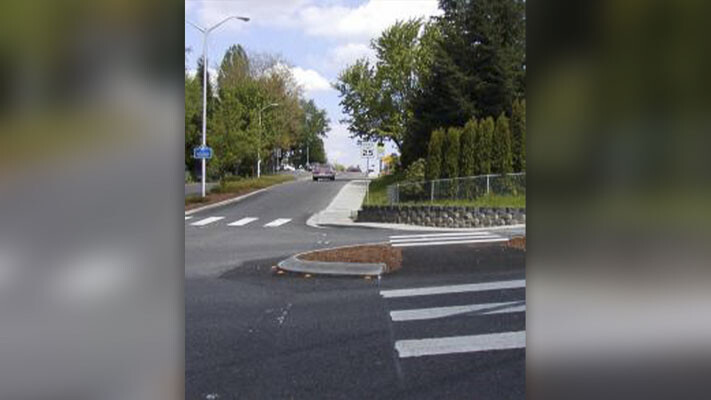
The program will allocate approximately $300,000 for traffic calming projects and has opened the call for project locations phase of the program
VANCOUVER – Vancouver community members are invited to submit traffic concerns and champion project locations for possible selection through the 2023 Neighborhood Traffic Calming Program to help slow traffic and increase street safety in local neighborhoods. The program will allocate approximately $300,000 for traffic calming projects and has opened the call for project locations phase of the program.
Community members interested in pursuing a traffic calming project for their neighborhood street must submit an official request using a simple online web form. Traffic calming applications will be accepted January 1 to February 28, 2023. After project locations are submitted by the end of February, project proponents will work through the program’s evaluation process with final project selection occurring in late October. The comprehensive program document, including timelines and requirements, can be viewed here or online, www.cityofvancouver.us/TrafficCalmingProgram.
The program encourages residents to champion project locations through the competitive selection process for funding and implementation. Past projects have included signing and surface striping, speed cushions/tables, radar feedback signs and street trees.
Vancouver’s Neighborhood Traffic Calming Program works in close partnership with the independent, community-led Neighborhood Traffic Safety Alliance (NTSA). The program offers various resources and project opportunities for community members seeking to slow local traffic, while creating a more livable community. Each year, neighborhood residents are invited to get involved in the program by shepherding projects through the competitive process, working closely with City staff and the NTSA as they proceed.
Guidelines for proposals to the Neighborhood Traffic Calming Program include:
– Residents/neighborhood associations may submit only one application per program year.
– A project proponent must champion the project proposal through the entire evaluation and selection process. If there is no project proponent, the proposal will not be considered for the program.
– Preliminary project cost estimates will be capped at $150,000 per project.
– Infrastructure projects (proposals that include adding a traffic calming device or structure onto or in the street) will be limited to only residential and collector arterial streets.
– Principal arterials will not be considered for the neighborhood program as they have higher traffic volumes and are typically reviewed, evaluated and considered through other City efforts.
– All projects must meet speed/volume criteria and demonstrate community support.
Funding for the Neighborhood Traffic Calming Program is available through a combination of Real Estate Excise Tax (REET), Transportation Benefit District (TBD) fees and multiple other revenue sources. Project costs are coordinated through several different strategies and partnerships within City departments to maximize cost efficiencies.
More details about Vancouver’s Neighborhood Traffic Calming Program, proposal guidelines and project proponent requirements can be found on the City’s website at www.cityofvancouver.us/TrafficCalmingProgram.
Information provided by city of Vancouver.
Also read:
- Deceased person found in Lake River near Ridgefield MarinaA man was found deceased in Lake River near the Ridgefield Marina on July 4. No signs of foul play were observed. A nearby sailboat, believed to be linked to the man, is also under investigation.
- County seeks nominations for local businesses, individuals for Disability Employment Awareness AwardsClark County is seeking nominations for awards honoring inclusive employment efforts. Winners will be recognized Oct. 8 at Clark College during a public event.
- WA watches CA as fed Title IX deadline looms; SCOTUS to hear trans athlete casesWashington state officials are monitoring California’s response to a federal Title IX deadline as tensions rise over transgender athletes in girls’ sports. Superintendent Chris Reykdal says the state won’t comply, risking $137 million in federal funding.
- Trump signs ‘big, beautiful bill’ during White House July 4 celebrationPresident Trump signed the “big, beautiful bill” on July 4 during a White House event featuring a military flyover and Republican leaders.
- Opinion: Changes made — and not made — to WA Cares in 2025Elizabeth New (Hovde) outlines 2025 changes to WA Cares, including new automatic exemptions and eligibility tweaks. She also warns that exemption rules could shift, potentially forcing some private insurance holders back into the program.
- Photos: 2025 Ridgefield Fourth of July Celebration ParadeThousands gathered in Ridgefield on July 4 for the city’s Fourth of July Celebration Parade. Mike Schultz captured highlights, from antique fire trucks to flyovers and local royalty like Miss Clark County and the parade’s grand marshal Chris Poppert.
- Letter: Can the president direct the U. S. Military to strike another country?Vancouver resident Jim McConnell questions the Constitutionality of presidential military actions without Congressional approval, citing historical precedents and legal opinions in response to President Trump’s 2025 strike on Iran.











